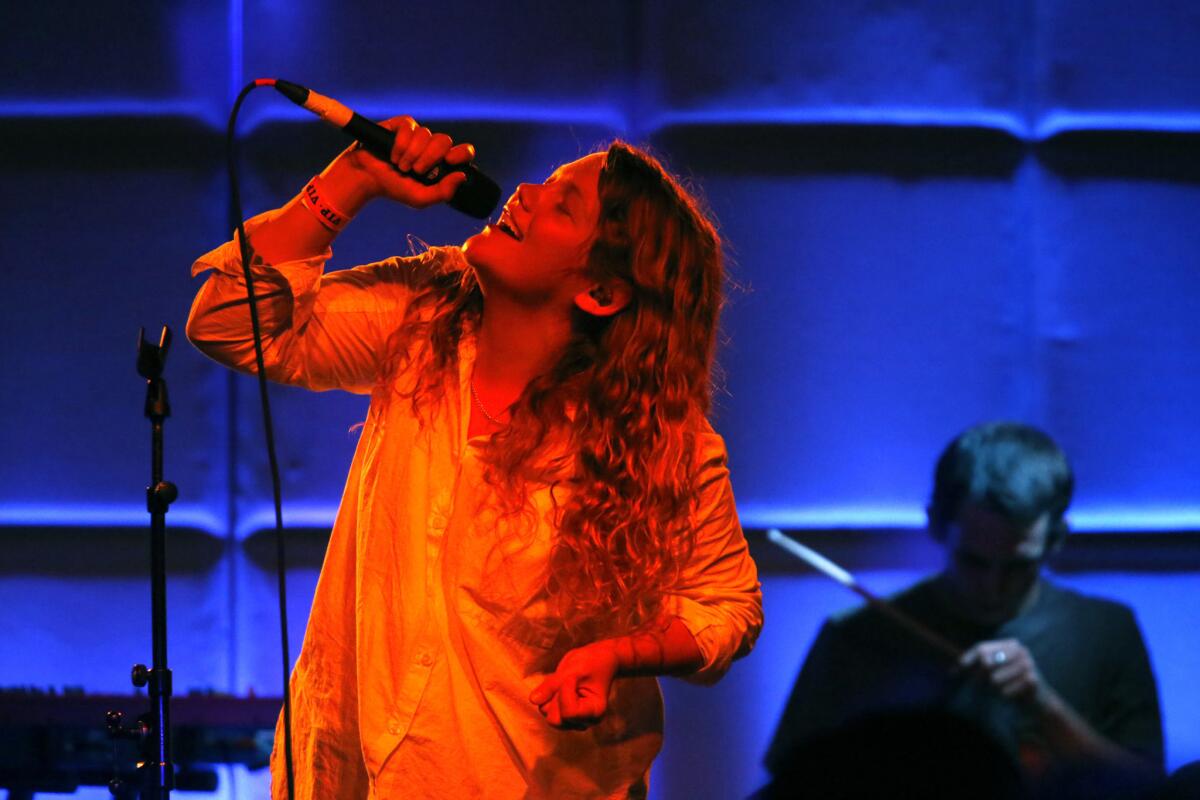Rapper-poet Kate Tempest opens U.S. tour with memorable Echo set

- Share via
Kate Tempest stared out at the crowd at the Echo on Saturday and absorbed the hundreds before her. “First time in America,” she said as part of an avalanche of verbiage that barreled from her mouth.
In the first set on her first U.S. tour, which is headed to Austin, Texas, for this week’s South by Southwest music festival, poet and rapper Tempest stood onstage with a look of blissful openness, her three-piece group prepping behind her.
“It will never be this again,” she said, marking the moment with a note of wonder. With Patti Smith-ragged brown hair and a wide-open smile, the artist had the room’s undivided attention from her first words to the last.
Those of us in the crowded L.A. club can say the same. We’ll never again enter a club with a mix of hope and skepticism, our minds scrolling through names of British rappers -- Dizzee Rascal, Lady Sovereign, Miss Dynamite, the Streets and others -- who were supposed to hit stateside but didn’t. We’ll never again exit a club gobsmacked by our first brush with this obvious talent, get blindsided by a presence who so easily connected with an audience of strangers and then led them into her head space and heart. We’ll never again reside in a Tempest-less realm.
The artist, 29, rendered the aforementioned Anglo-rap comparisons moot. Building momentum with a thick accent, Tempest spun long, mesmerizing stories equally influenced by hip-hop lyricism and oral storytelling, like “Supreme Clientele”-era Ghostface Killah but through the eyes and voice of a whip-smart white woman from the working class Brockley district of London. The beats were different -- more fluidly British than start-and-stop hip-hop -- but the phrase-turns were as vivid.
With a commanding stage presence and furiously sharp delivery that suggested Smith at CBGB in 1977, Tempest described in metered lines scenes set around dinner tables and out in clubs, connected by lost and desperate characters who sprang to life as they poured from within her.
“Marshall Law” was set in a trendy bar, one she described as: “Everywhere is monsters / [Breasts] out, wet-mouthed, heads back/ Shouting and screaming just to prove they exist.” Scene thus set, Tempest introduced a protagonist named Becky and a video director named Marshall Law who was “head to toe in yellow velour” and “holding court about the science of image / While the sycophants giggle and grimace.” A chance encounter with a cocaine dealer named Harry opened the door to an epic yarn about love, class, drugs and sexuality.
Tempest arrived on the shores with bona fides: an admired young writer whose book-length poem and performance piece “Brand New Ancients” won her the prestigious Ted Hughes Award for poetry in 2013 and whose 2014 album, “Everybody Down,” was shortlisted for the Mercury Prize. And despite her introductory remark, Tempest has performed in America once before, when she delivered “Brand New Ancients” in New York as a theater piece with musical accompaniment. Saturday repeatedly confirmed the acclaim.
In “Circles,” Tempest rapped of a heart -- or what she called a “dumb chunk of muscle with its claws out” -- in the gutter, “talking to itself, starting to flutter / When it thinks about yours / Barking at mutts like a nutter / Trying to start wars on the bus.”
She moved to the chorus, describing a soul spinning circles but “not graceful, not like dancers, not neatly like a compass and a pencil.” Rather, she rapped as percussion and synths throbbed, “more like a dog on a lead, going mental.” Later in the track she described drinking in a pub alone with her eyes closed, “swaying to a power ballad, shedding tears at the high notes.”
Her works, less raps than tight, melodiously crafted free verse set to music, connected over the night to form a bigger piece. Like “The Canterbury Tales” except about coke dealers, shy stuttering boys, hookers searching for ways to be “more than a sum of your parts,” double-crossers, souls residing in bars filled with fake laughs and in back offices with shark tanks and crooks.
Few are the lyricists who cite as influences the collected works of William Blake, W.B. Yeats and the Wu-Tang Clan. Fewer combine them with such fearless skill. Like the poet-hyphenates rapper Saul Williams, post-punker John Cooper Clarke, reggae toaster Linton Kwesi Johnson and punk rocker Smith, Tempest hit that sweet spot between oral storyteller and word percussionist. She rapped her ideas with a punch that when intertwined with her musicians created something epic.
She did it to a series of rhythms that merged British grime, American hip-hop, instrumental beat music and Jamaican dancehall. The studio versions sound tame in comparison; it’s hard to appreciate Tempest’s skills without experiencing the whole package, with beats as voluminous as her throat.
Raw, honest, open, filled with ideas and a whirlwind of rhythmic wonder in expressing them, Tempest’s inexhaustible voice poured forth keenly crafted verses, South London stories about dealers and the women who conflictingly love them, about lives spent “in a city where it’s hard to be heard / And nothing has much meaning.”
In Tempest’s work, these lives are dense with meaning, and through her wildly skilled performances, they will certainly be heard. They couldn’t ask for a better documentarian.
Follow Randall Roberts on Twitter: @liledit
More to Read
The biggest entertainment stories
Get our big stories about Hollywood, film, television, music, arts, culture and more right in your inbox as soon as they publish.
You may occasionally receive promotional content from the Los Angeles Times.











